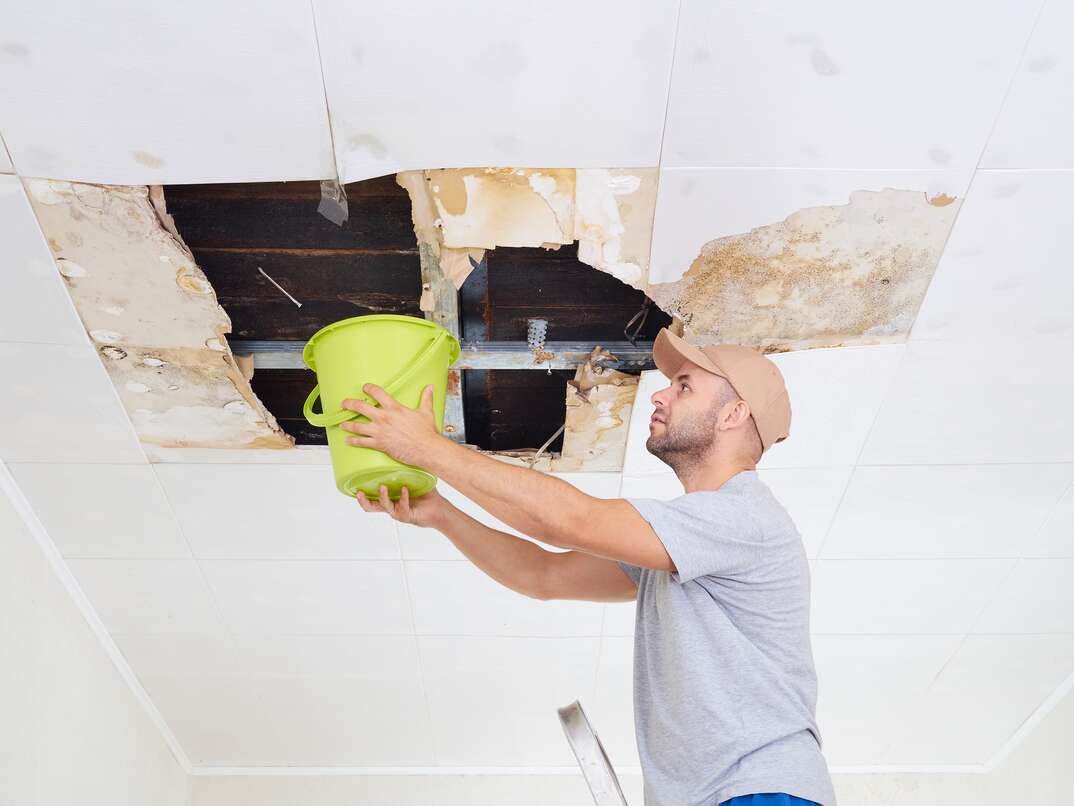- AppliancesElectriciansHVACLandscapingLocksmithPest ControlPlumbingRenovationRoofingT V RepairAll Home Improvement
- Car AccidentClass ActionCorporate LawCriminal DefenseDivorce LawEmployment LawFamily LawFinancial LawLegal AidMedical Injury LawyersMedical MalpracticeReal Estate LawWater Fire RestorationAll Legal
- InvestmentRetirementAll Finance
- Animal InsuranceAutoGeneral InsuranceHealth PolicyHome RentersAll Insurance
- DentalHealth SpecialistsAll Medical
- Animal CareVeterinaryAll Pets
- Auto GlassTowingAll Automotive
The Condo Above Mine Flooded. Whose Insurance Is Responsible?

It starts as a wet spot on the ceiling. Then there's a drip. The next thing you know, water is pouring through your ceiling from the condo above you.
Maybe your neighbor left their bathtub running, or an accident caused their water heater to leak. Either way, you're both left with a mess. These scenarios can leave you asking who's responsible for water damage in a condo, especially when the water comes from an upstairs neighbor.
Condo owner's insurance covers many types of water damage, but whether it will cover yours depends on the cause. Many policies cover water damage from:
- Burst pipes
- Air conditioning units
- Broken appliances
- Plumbing issues
Like many homeowners insurance policies, your condo insurance may cover damage that's considered accidental under the terms of your policy. You can check your policy for definitions or speak with your insurance agent.
Be aware that this coverage is available through insurance you can purchase as a condo owner. Your homeowners association probably has a policy that covers part of the building, such as the roof or common areas, but this master policy won't cover individual condos.
When Doesn't Insurance Cover Water Damage in a Condo?
Insurance often covers water damage from an unforeseen or accidental event. However, insurance may deny coverage if the damage is due to wear and tear or your failure to maintain plumbing.
Like other homeowners insurance policies, condo insurance typically doesn't cover damage from natural flooding. If you have a first-floor condo and a river behind your building floods, it won't be covered by a typical policy. You may wish to purchase separate flood insurance if you're worried about natural disasters or storm flooding.
More Related Articles:
- 7 Clauses to Look Out For in Your Homeowners Insurance Policy
- What’s a Deductible?
- Insurance Terms, What Is an Act of God?
- What Is an Insurance Premium?
- What’s the Difference Between Homeowners and Renters Insurance?
Does Condo Insurance Cover Water Damage Caused by Someone in a Different Unit?
An overflowing bathtub or a broken pipe in the unit above you can easily cause water damage in your condo. Whether the problem upstairs is caused by an accident, your neighbor's negligence or pure bad luck, you should file a claim with your insurance company.
Your insurance company may be able to help you start paying for repairs right away, even if a neighbor's negligence caused the damage. Your insurer may contact your neighbor or their insurance company to help you determine which policy will pay for the damage.
Who's liable for the damage can depend on several factors, including:
- The terms of each insurance policy
- The source of the water, such as a broken pipe, appliance or overflowing toilet
- Whether factors such as weather or building maintenance contributed to the problem
- Whether negligence by your neighbor caused the flooding
You may need to pay your deductible to get coverage from your insurance company. If the damage is ultimately found to be due to your neighbor's carelessness, you may be able to seek reimbursement.
Contacting your insurance company immediately can help ensure you take the proper steps and don't encounter problems with repairs. Your insurance agent or another company representative can help you better understand the claims process.
Sometimes, excess water comes from a nearby common area. Communal washing machines, hot tubs and leaky roofs can lead to water damage in your condo.
In these cases, you should still begin by contacting your insurance company, but you may have to rely on your own coverage for repairs. For example, the policy held by the HOA may cover repairs to the building or common areas but not private units. The specific terms of the HOA policy may vary. Some master policies may provide coverage under specific circumstances, such as water damage from a roof leak.
Additionally, if negligence, maintenance or repairs lead to water damage, the HOA or other responsible party could be liable for costs. You may wish to request a copy of the insurance policy held by the HOA. Reviewing the policy can help you determine who's liable for repairs in a particular situation.
Elocal Editorial Content is for educational and entertainment purposes only. Editorial Content should not be used as a substitute for advice from a licensed professional in your state reviewing your issue. The opinions, beliefs and viewpoints expressed by the eLocal Editorial Team and other third-party content providers do not necessarily reflect the opinions, beliefs and viewpoints of eLocal or its affiliate companies. Use of eLocal Editorial Content is subject to the
Website Terms and Conditions.The eLocal Editorial Team operates independently of eLocal USA's marketing and sales decisions.



